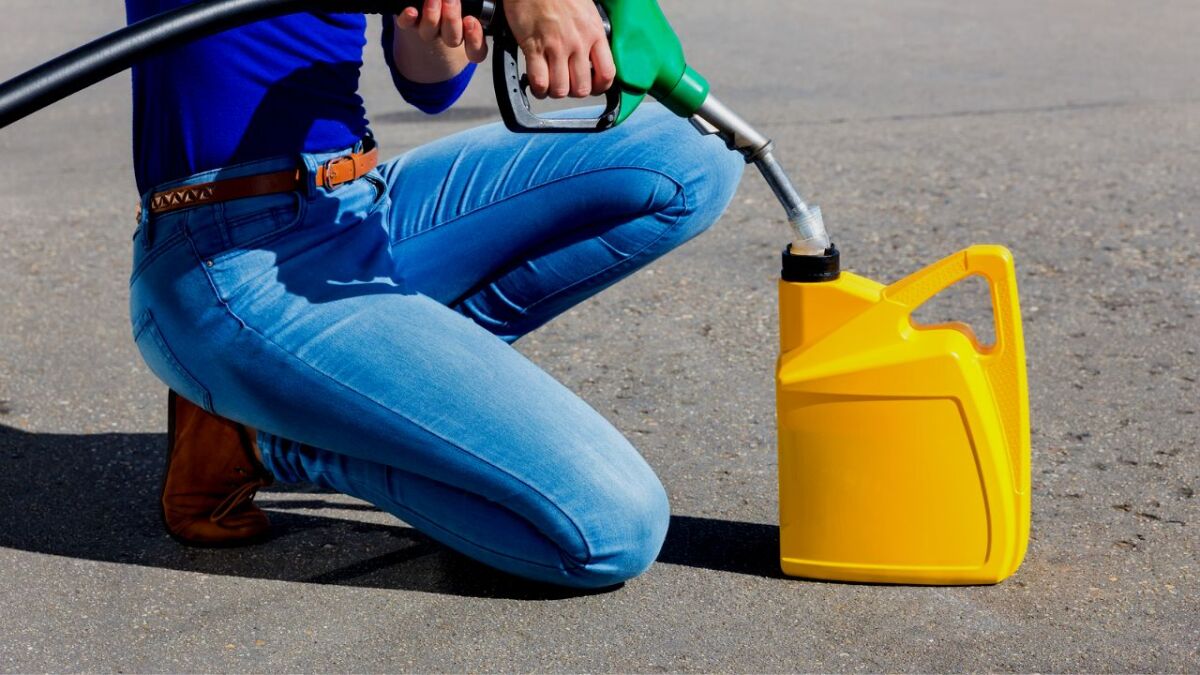
You need to know about the long-term storage of gasoline (shelf life, regulations in germany, tips).
👉 The key facts from this guide
- The storage of gasoline is complicated and potentially dangerous, as it spoils quickly and is highly flammable.
- The durability of gasoline is influenced by various factors, including the ethanol content and the presence of water in the fuel.
- It is possible to store gasoline for a longer period of time by keeping it in a suitable container and stabilizing it.
- It is important to follow the laws and regulations regarding gasoline storage. In Germany, for example, you are allowed to store up to 20 liters of gasoline in garages or basements.
- It is necessary to regularly check whether the gasoline is still usable before using it.
- The use of stabilizers can help slow down the breakdown of gasoline and extend its durability.
If you're concerned with crisis preparedness, you probably already know that your most important resources are food, water, and a safe place to stay.
But have you ever thought about another resource that could become essential in the event of a crisis?
I'm talking about fuel–gasoline, to be precise.
And perhaps you've also wondered whether you're allowed to store gasoline, and if so, how much and how to do it safely. Does gas actually go bad and become unusable at some point? How long is it good for?
Let's clarify and answer these questions now.
For a quick overview
Short on time? Here are the key points:
Quick overview
- Storing gasoline is complicated, since it spoils quickly and can potentially be dangerous.
- The shelf life of gasoline is influenced by different factors, such as ethanol content and the presence of water in the fuel.
- It's possible to store gasoline for longer periods by keeping it in a suitable container and stabilizing it.
- But it's important to be aware of the laws and regulations in your country.
- It's also necessary to regularly check whether the gasoline is still usable before using it.
If you want to be cautious and get all the information on the topic, keep reading.
Storing gasoline poses a significant risk as well as a major opportunity
Whenever you need to travel over long distances, you usually need a vehicle that runs on gasoline.
For the purposes of this article, I will leave electric cars out of the discussion since they too become useless if the local power grid collapses (Read here to find out what a blackout is and how to prepare for it).
But gasoline plays a significant role not only in transportation.
If you intend to operate a generator to produce energy autonomously, then that generator also needs fuel.
The ability to store and safely handle a certain amount of gasoline should also be part of the standard repertoire of anyone who is preparing for an emergency.
Therefore, in this article, I would like to take a closer look at the following points:
- How do you store gasoline efficiently and successfully?
- What tools do you need?
- What safety precautions must be taken?
- What legal regulations exist?
- Does gasoline become unusable over time?
As you can imagine, storing gasoline is anything but risk-free. Especially if it is done incorrectly, it can even be dangerous.
Long-term storage of gasoline, therefore, poses a certain problem. Storing gasoline in large quantities is even more challenging.
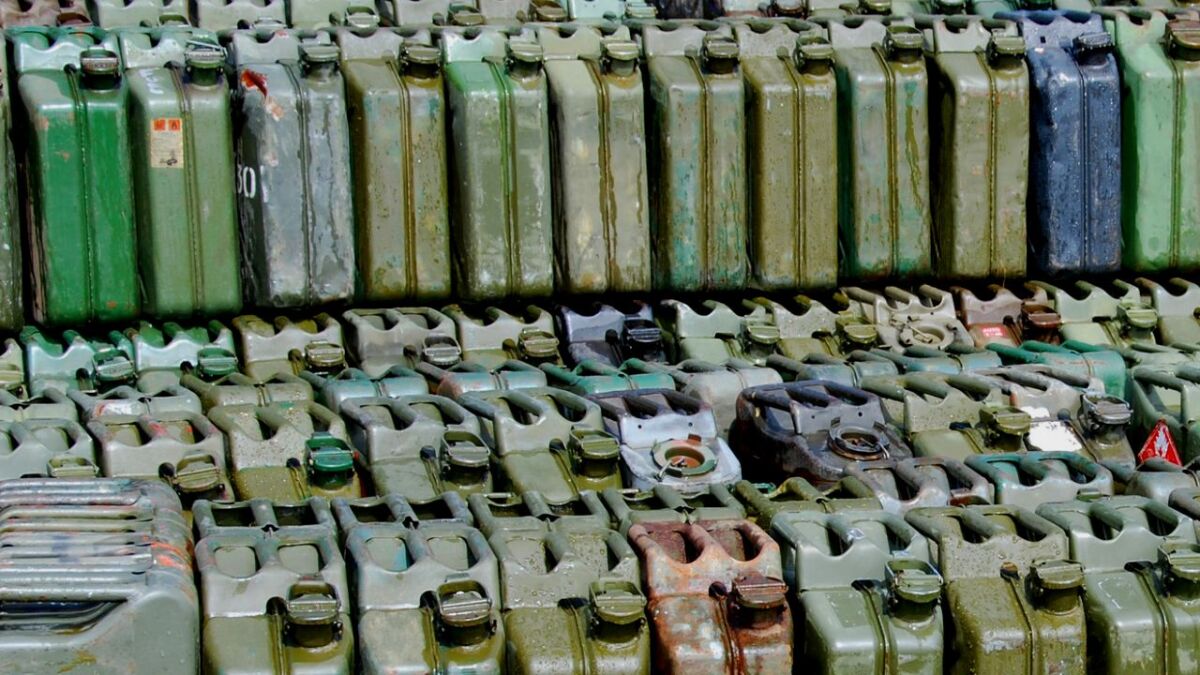
I want you to keep the following in mind: storing gasoline is by no means easy and will present you with many challenges.
Accordingly, it either represents a great risk or an equally great opportunity for you. However, if you approach the matter responsibly, the endeavor will be worthwhile. That's exactly what this article is for.
What makes storing gasoline so complicated?
To understand why gasoline is so difficult to store, you should know a little about the underlying chemistry.
What we call "gasoline" or "fuel" is by no means a "pure" product that consists of only one certain active ingredient that provides us with energy. In fact, the opposite is true.
To comply with certain regulations and guidelines of legislation, gasoline is a mixture of various liquids, all of which are comparatively easily flammable and relatively unstable.
Of course, they have to be that way in order to ultimately be burned in your car and converted into energy.
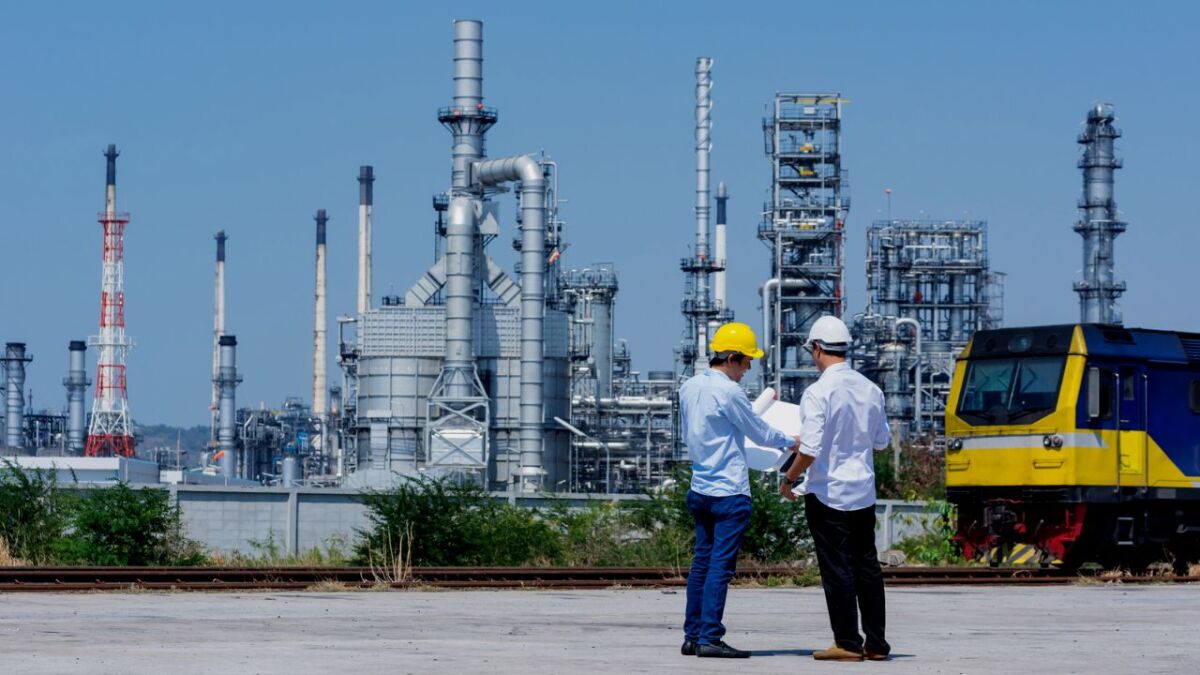
Usually, the gasoline in your car is a mixture of 150 different parts that are made from oil. Ethanol is also added in variable concentrations, especially for environmental reasons (previously it was the toxic lead).
As you probably suspect, the many different substances have a significant impact on the "lifespan" of gasoline and also influence the necessary storage methods.
Pure gasoline - does that even exist?
You will hardly find pure gasoline, i.e. the product produced in the refinery before additives like ethanol are added, at gas stations nowadays.
Almost every fuel produced today contains at least a small amount of stabilizers or additives, which however already affect the durability and storage.
Pure gasoline, by the way, lasts about 3 to 6 months or even longer, a comparatively long time.
However, the fuel ready for sale has a shelf life of only 2-3 months - at least stored under not too optimal conditions. But where does that come from?
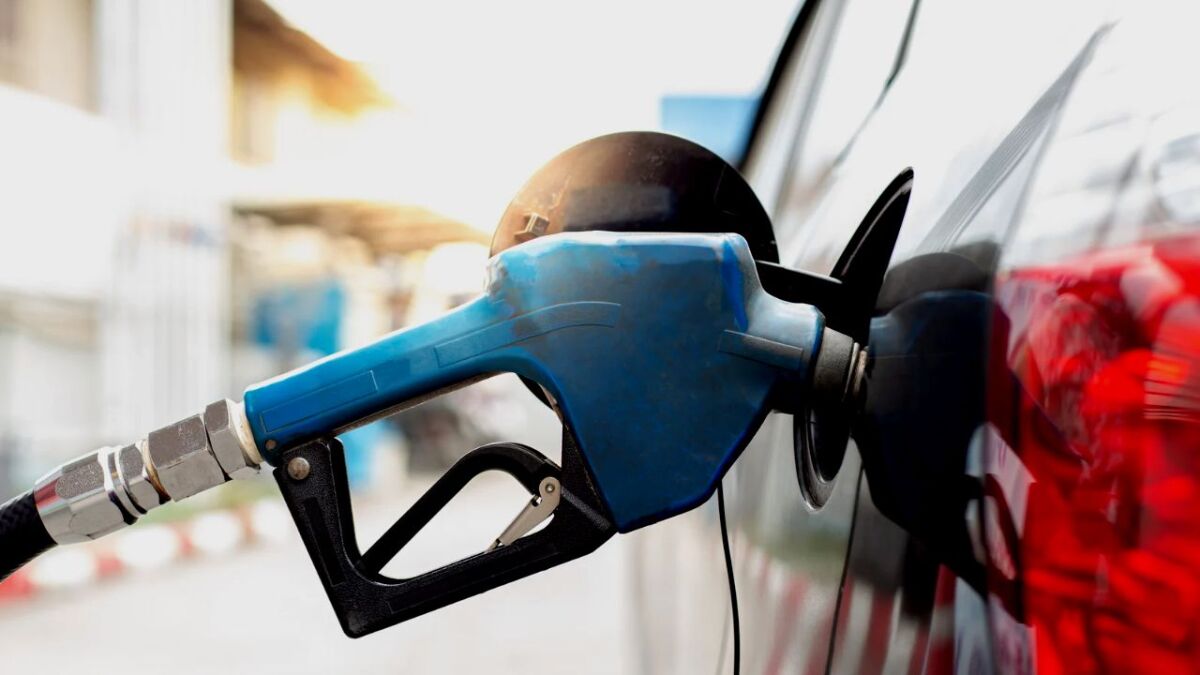
Ethanol affects the durability of the fuel
As already mentioned, almost all "varieties" of gasoline contain some ethanol. And by "some" I mean at least 10 percent.
Ethanol significantly reduces the durability of the mixture, often by several months. In the tank, the generator or not stored correctly, you can expect a shelf life of only a few months.
Unfortunately, you will have to live with a certain amount of ethanol in your gasoline, unless you have the technical means of extraction available (which is highly unlikely unless you have your own refinery).
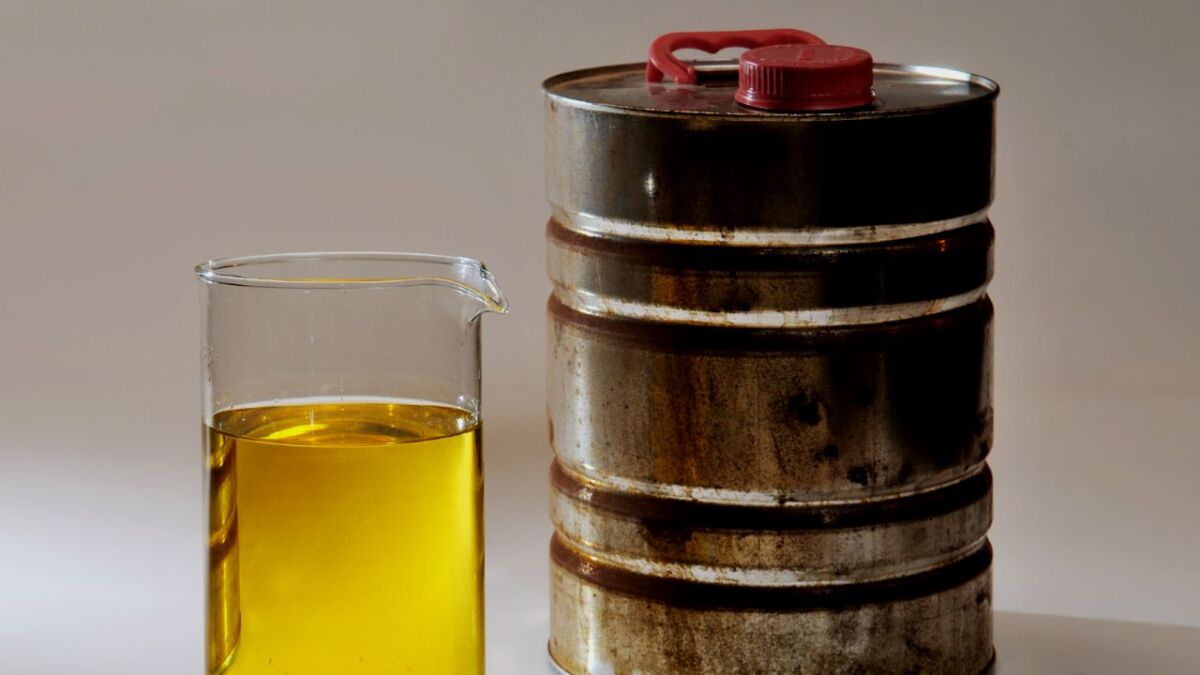
Which external factors shorten the shelf life of gasoline?
Unfortunately, there is no good news to start with here either. Heat/warmth, evaporation and moisture all contribute to shortening the life cycle of fuel.
This applies even if you store it in the best commercially available containers.
Time is working against you, no matter what you do. Gasoline that has exceeded its "expiration date" produces significantly less energy and is therefore hardly suitable for use.
Even worse: some mixtures break down over time into their individual components and can cause damage to your vehicle or generator.
Can I still store gasoline for the long term? How long is gasoline durable?
After receiving one bad news after another in the last sections, it's time for some positive energy now.
If you make an effort, work responsibly and create the best conditions to store your gasoline, it is even possible to keep the fuel usable without risk for up to 3 years with proper storage.
The ADAC even went one step further and tested fuel that had been stored for 25 years. And the result: provided it is stored correctly, fuel lasts at least a quarter of a century.
The premium gasoline had been stored in airtight metal containers; the now carried out check showed that the fuel could still be used.
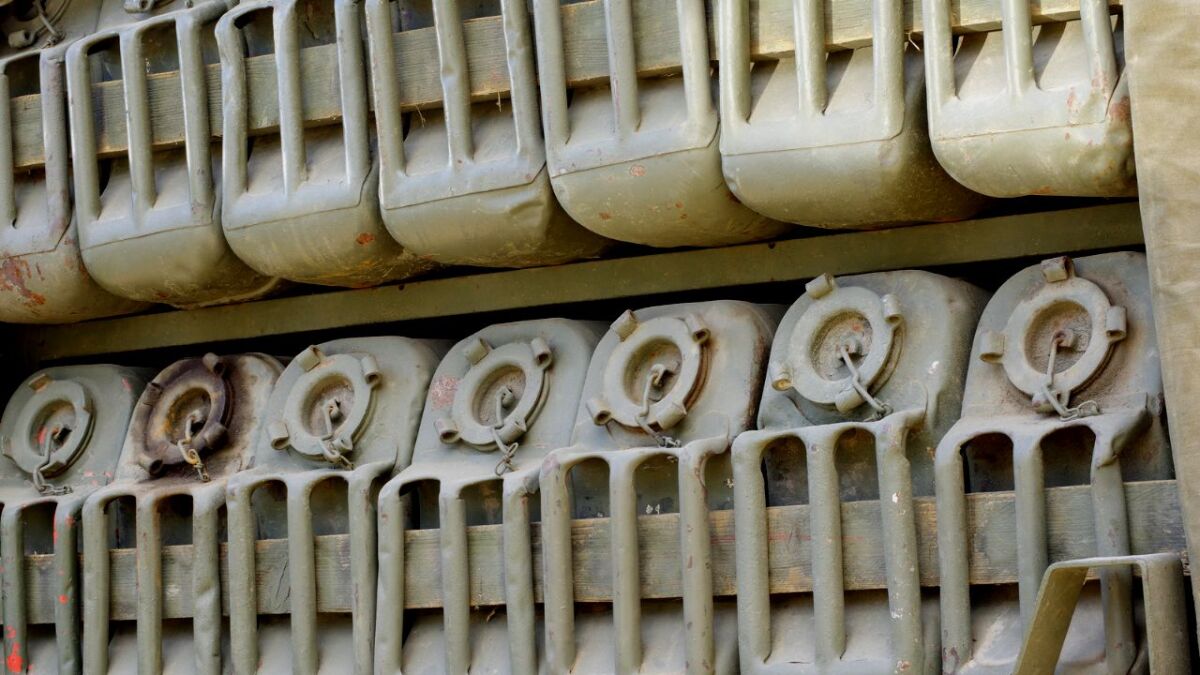
But be careful: do not expect such a long storage time: 3 years are achievable, but they are clearly at the outer limit of what is possible.
It is better to keep things a bit shorter and regularly check your stocks. When it comes to storing gasoline, it is particularly important not to take any risks.
To make this work, however, you should take stabilizing measures to at least slow down the decay of the fuel, which cannot be completely prevented. That's all that matters when it comes to appropriate gasoline storage.
Stabilizers - what do they really do?
Stabilizers are products that are supposed to enable the long-term storage of gasoline. While the modes of action of these products vary, they are all supposed to slow down the oxidation and decay of the fuel - because not even the best products can stop this process.
In some cases, the stabilizer binds to water so that it does not mix with your fuel and dilute it until it becomes ineffective.
Ethanol has replaced lead over time
You surely remember the terms "unleaded" or "super unleaded", right? Of course, because not too long ago gasoline contained no or very little ethanol, but instead lead.
This was supposed to increase the performance of the engines and prevent too much wear and tear.
Unfortunately, lead is a toxic substance whose gases are thrown into the air in large quantities during combustion. To prevent this, lead was completely replaced by ethanol.
In principle, this sounds like a good thing, but this exchange also brings disadvantages in terms of durability.
The problem lies in the water
This may sound unexpected to you, but water is one of the biggest problems regarding the durability of gasoline.
Ethanol is hygroscopic, which means that it has the ability to absorb water from the environment and ultimately bind it to itself. Ethanol is present in at least 10 percent of fuel and ambient water (in the form of humidity) is always present.
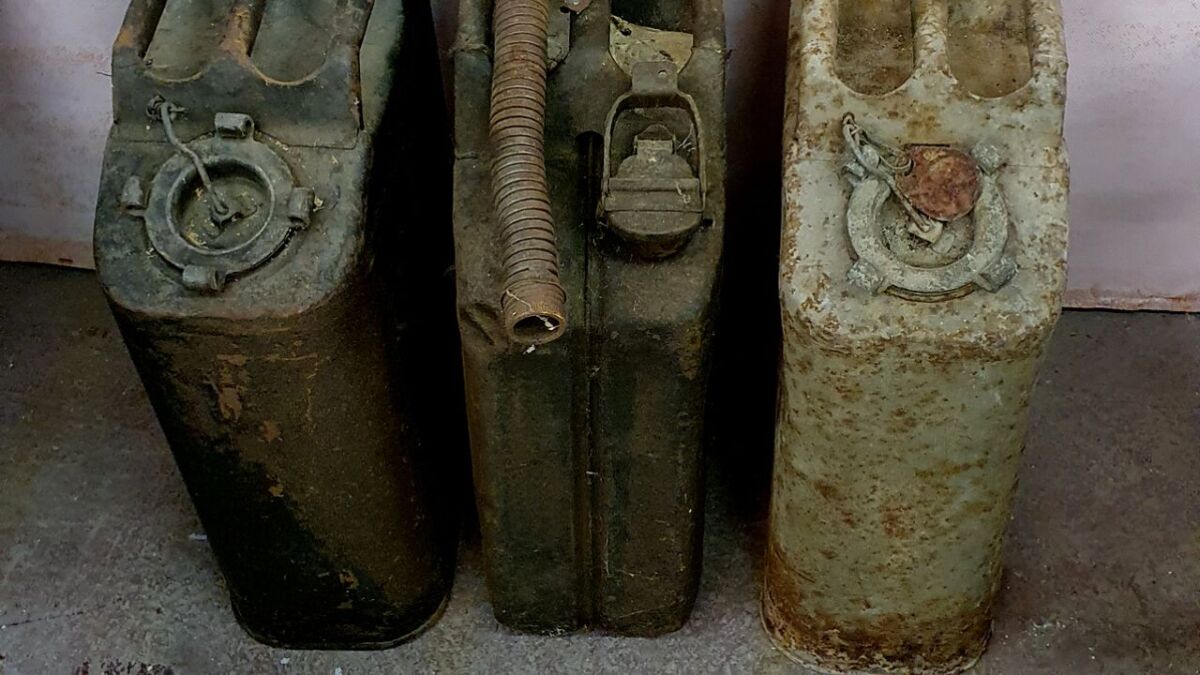
So, are you starting to see what the problem is?
Constant evaporation of water in turn means constant absorption of water by the ethanol, which in turn means a continuous dilution of the fuel. The mixture of water and ethanol becomes less and less flammable and ultimately sinks to the bottom of the tank.
The more water is absorbed, the worse it gets. Over time, the tank begins to rust and contaminate the entire engine.
Can stabilizers solve the problem?
Answering this question is not quite simple. Most products that come to market as stabilizers are mixtures with alcohol/ethanol and/or water.
This is intended to prevent the existing ethanol from absorbing water molecules and making the fuel unusable over time. Stabilizers cannot completely prevent this process, however.
A large proportion of the products are produced on the basis of petroleum. These are often proprietary hydrocarbon mixtures, which are intended to prevent and slow down oxidation.
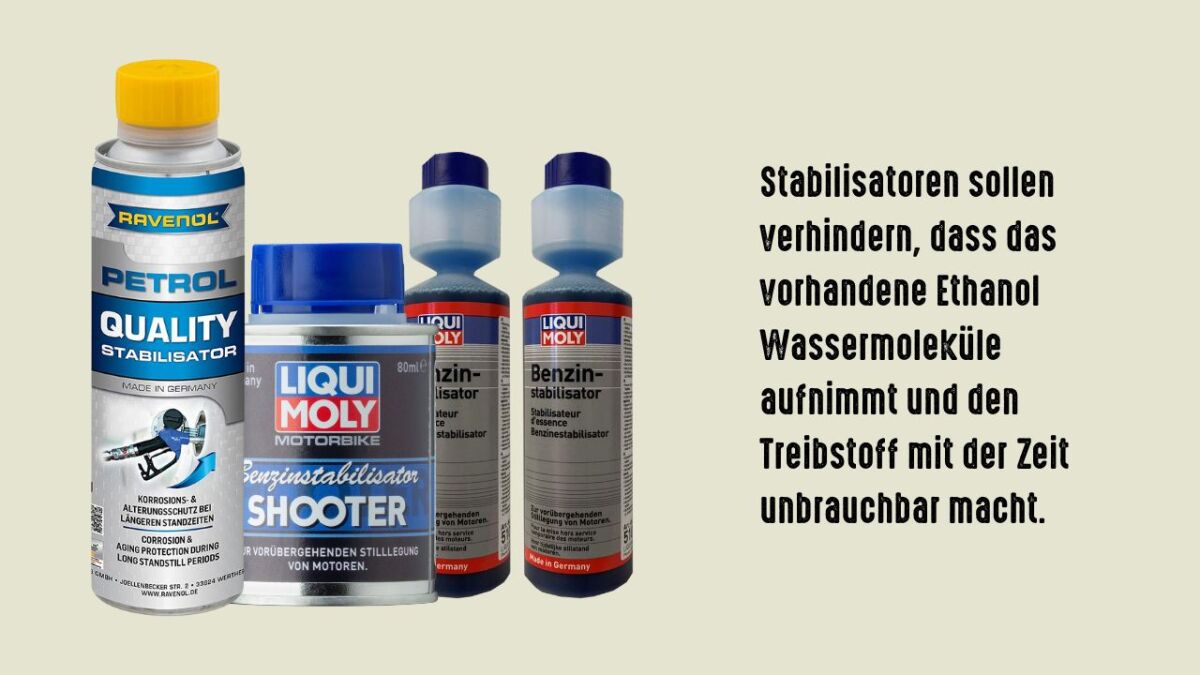
Or lubricants can be used that are supposed to combine with the gasoline in general or the water content in it to produce a combustible mixture again.
Before you go out and buy stabilizers, whether for your car or generator, make sure to check with the manufacturer to see if and which products are suitable for it.
Perhaps your manufacturer has already released stabilizers that are tailored exactly to your product. Maybe you can also get a recommendation.
If you don't do that, you run the risk of causing more damage than preventing it. Not every stabilizer is suitable for every type of fuel and every purpose. So take a few minutes and make sure you get the right product.
If you actually choose the right stabilizer and use it accordingly, you may not be able to stop the decay of the fuel but you can slow it down enough so that you don’t have to think about further measures for about a year. So a little research can pay off in the long run.
How should you store your fuel?
What plays at least as important a role as the correct use of stabilizers is the correct storage of gasoline.
However, the risk of failure is greater here, and there is also a greater danger associated with incorrect storage, which can even threaten life and limb.
Especially if you store several cans of gasoline for a long time, you must consider that you have a large amount of highly flammable substances around you.
In principle, there is a potential fire bomb in your front yard, basement or storage room. Therefore, you definitely want to play it safe to avoid endangering anyone.
How much gasoline am I allowed to store according to the law?
According to the law, you are allowed to store up to 20 liters of gasoline in garages, small garages or cellars. Only if your garage has an area of at least 100 square meters, are you allowed to exceed this amount.
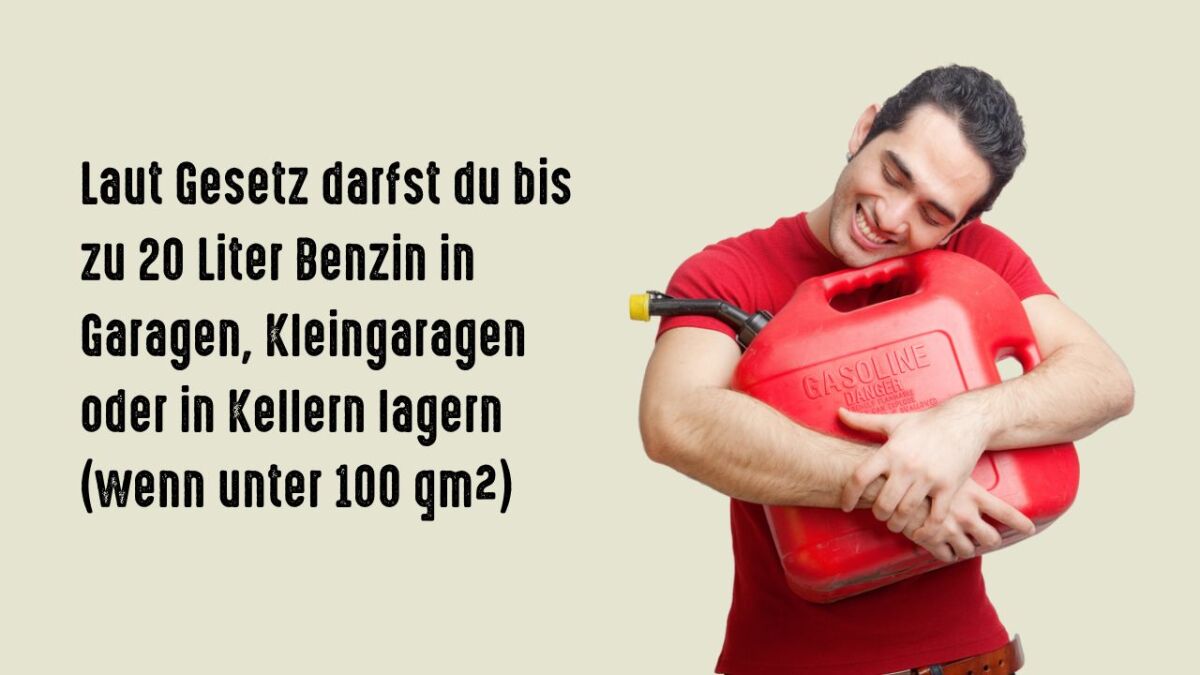
However, keep in mind that even 20 liters are enough for a considerable explosion that can cause a lot of damage.
This amount of 20 liters of fuel applies to the entire cellar or garage area. Therefore, you are not allowed to store 20 liters in each individual room if the cellar has several rooms.
Especially in residential buildings with separate basement rooms for each tenant, it can be difficult to reach safe agreements, as it is almost impossible.
As a tenant, you should urgently inquire beforehand whether the storage of gasoline and diesel is part of the rental agreement or house rules. Often, the storage of these fuels is strictly prohibited.
A maximum of 200 liters of diesel is allowed. Since diesel is not as flammable as gasoline, you are allowed to store ten times the amount here. However, due to the rapid perishability of diesel and the risk of vapors, this makes little sense.
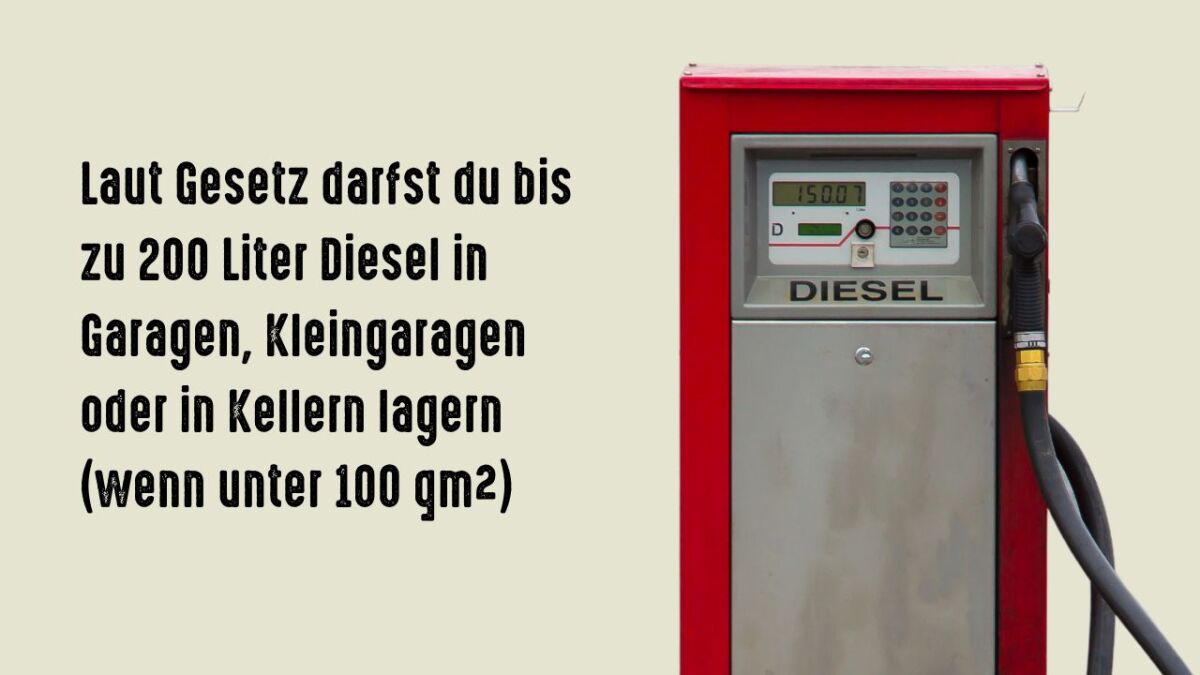
How many full reserve canisters am I allowed to store in the car?
In Germany, no more than 60 liters per reserve tank and 240 liters per "transport unit" are allowed in private vehicles. "Transport unit" is a technical term from the hazardous goods industry, which refers to a vehicle with or without a trailer.
The container must have a permit from the UN or Reserve Fuel Canister System (RKK). The corresponding labeling is attached to the tank.
How much gasoline is allowed to be stored in a garden?
It is not recommended to store gasoline in the garden as it poses a fire hazard. If you need to store gasoline, inquire about local laws and regulations to find out where the limits are. In Germany, a maximum of 20 liters of gasoline can be stored in the garden. It should also always be stored in an approved container and kept away from potential sources of ignition.
The right container
Just ahead of time, the following information for you: You may have noticed that this article contains different information about the lifespan of gasoline, primarily because incredibly many factors play a role and the maximum can differ enormously from the minimum duration.
The following information should be viewed under optimal conditions, which you can achieve with your abilities.
The possible duration of storage also differs for different materials of the containers, which is why I specifically name them in the following section.
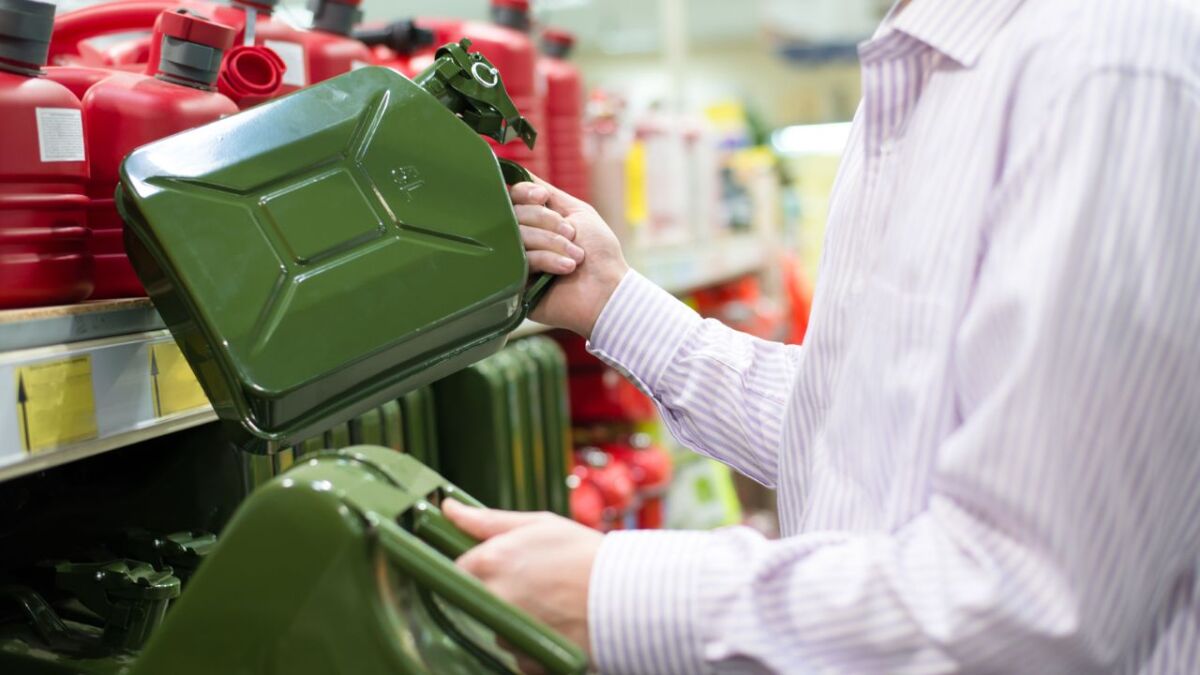
Plastic canister
In canisters or barrels made of plastic or synthetic materials, gasoline can hold for about 1-2 years under optimal storage conditions. However, keep in mind that decay is not completely stopped, and regular testing should take place.
The exchange of air and oxidation is still possible in plastic barrels, albeit to a limited extent.
The escape of flammable vapors from leaking reserve tanks can lead to a dangerous situation. Therefore, fuels should only be stored in tanks equipped with RKK or UN certification.
Here is a recommendation for plastic gasoline cans:
Metal canisters
If you are planning to store fuel for a longer period of time, plastic containers are not the best solution.
Instead, invest a little more and get yourself barrels and containers made of metal. With optimal sealing, there is no more air exchange, which greatly extends the shelf life. With proper use of stabilizers, this can even mean several years of shelf life.
The containers used for storage must in any case be safely sealable and shatterproof. For safety reasons, it is recommended to use those made of metal, as plastic gasoline cans are usually not completely airtight.
Here is a recommendation for metal gasoline cans:
The right storage and environmental conditions for gasoline
The environmental conditions in which you store gasoline not only play a role in its shelf life, but can also minimize or increase existing hazards.
It is therefore important to consider how you will proceed in order not to neglect the aspect of your personal safety.
Where should you store gasoline?
- As already mentioned, you can store your gasoline either in the basement or in the garage.
- If you want to store larger quantities, you should look for a space that is as empty as possible and free of spark sources or other risk factors.
- Make sure that there is no risk for the containers that contain gasoline. If the gasoline containers break and the gasoline starts to leak, an extreme safety risk quickly arises for the entire environment.
- Make sure that you store your gasoline as far away as possible from light or power sources, as there is also an enormous safety risk here.
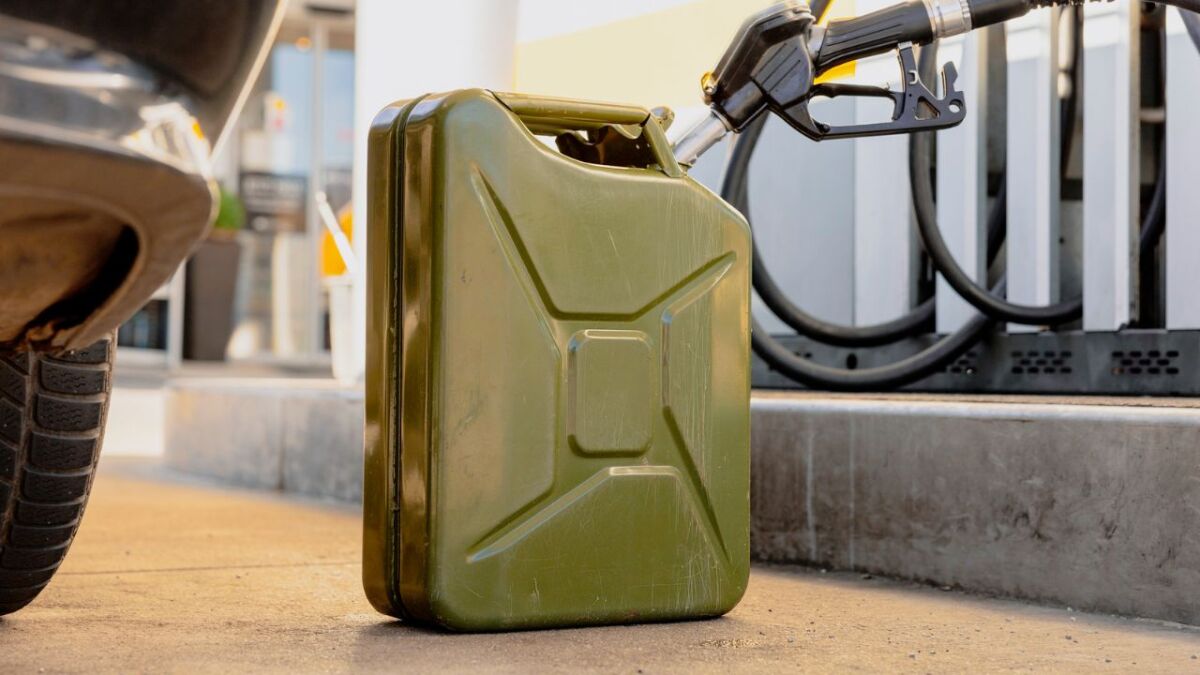
Storing gasoline and diesel in sensitive locations that can pose an increased risk is prohibited by law. This includes publicly accessible passages, stairs, corridors, and driveways - as well as places that are open to other persons.
In addition, it is prohibited to store fuel in attic floors of residential buildings. In private apartments, the storage of gasoline and diesel is generally allowed, but limited to a maximum of one liter (however, the legislator was thinking more of cleaning gasoline here).
Caution: Storing fuel at home is life-threatening - they contain easily flammable vapors that can escape from storage containers that are not completely sealed.
Are there guidelines regarding storage temperature?
Under no circumstances should gasoline be stored in direct sunlight or at temperatures that are too high. As a basic rule, storage should always be at temperatures below 21 degrees Celsius. 21 degrees Celsius is a guideline, past which the fuel can be considered highly flammable and should not be stored.
Cold, on the other hand, has no damaging or hazardous effect. This allows you to store gasoline even at low temperatures below 0 degrees Celsius. This means that you don't have to change your storage location in winter because you expect extreme cold. So, it's better to store your gasoline too cold than too warm.
Always pay attention to applicable laws and regulations
If you want to store gasoline for a long time, it's important that you know the applicable laws and regulations. Violations can be punished with severe penalties, which cannot be your intention. Stay informed regularly to stay up to date.
Also, remember that laws and regulations can change over time, and the government expects you to keep up to date on your own. As is generally the case with prepping, self-reliance and personal responsibility are an absolute must!

Take notes or label your containers
Especially important: Keep a record of when you filled which container with which fuel. Number, label, or mark the containers with the fuel filling date so that you can always trace which fuel has been stored in which drum for how long.
This will be particularly important when you need to determine which fuel needs to be checked for shelf life. After all, you don't want to use bad or "expired" fuel for your purposes, right?
So always stay up to date, know your stored gasoline and its containers.
Regularly check your inventory and dispose of gasoline properly
This point is self-explanatory. Regularly check your fuel supplies, especially those that are slowly reaching the end of their usability according to the schedule. If you find too old, unusable gasoline, proper disposal is particularly important.
Improper disposal of gasoline can result in very high fines for you and also have a huge impact on the environment.
Take the old fuel to your local recycling center or inquire about hazardous waste disposal facilities near you. If you can't find anything, you can also ask your municipality for help.

Recognizing Bad or Unusable Gasoline: Tips and Tricks
So that you also know how to recognize bad, old or unusable gasoline, I have put together a few tips and tricks that you should pay particular attention to:
- Pay close attention to contamination. If there are bits floating in the fuel or atypical discolorations, the fuel should not be used anymore.
- You can recognize the high age of a fuel by the visible "separation" of the substances from each other. At this point, the effectiveness of the gasoline has at least decreased.
- If a distinct sediment has already formed (for example, ethanol has almost completely settled to the bottom and is clearly visible), the fuel is most likely no longer usable.
What happens if you still use bad gasoline?
If you ignore the condition of your gasoline and still use it to fuel your car, there are several possible scenarios:
- The fuel is still somewhat functional and allows you to move. However, your engine will suffer damage, and you should not expect to travel too far. Additionally, your car may become unusable after using this fuel.
- Nothing happens. You don't move forward, and your engine does not suffer too much damage. The fuel is simply unusable.
- The worst-case scenario occurs: you don't move forward, while the bad fuel causes irreparable damage to your engine, requiring a full repair.
To put it mildly, in normal everyday life, it is simply an expensive annoyance if your engine breaks down due to bad gasoline.
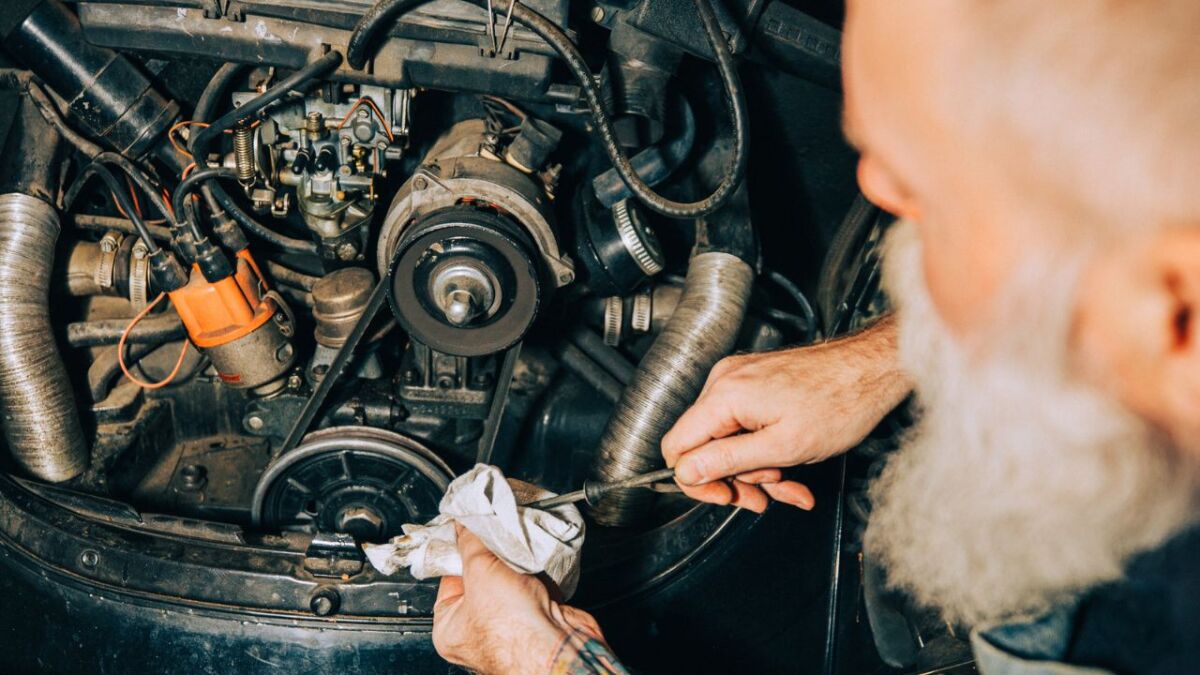
In an exceptional scenario, such as when a crisis occurs, it can be dangerous. Your only means of transportation that you could have used for long distances is gone, and you have hardly any means of repair.
So, it's better to take the extra time to regularly check your inventory to avoid having to face serious consequences in the worst-case scenario.
Conclusion: Long-term storage of gasoline can be worthwhile if you observe all safety precautions
To put it plainly, if you store your fuel responsibly and observe the necessary safety measures, nothing can happen.
On the contrary, you get the tremendous advantage of mobility over long distances, even in crisis scenarios. If you do it right, it's a worthwhile endeavor.
However, I don't want to downplay the associated risk. If you only follow safety precautions inadequately or not at all and store the gasoline incorrectly, you either get nothing out of it or expose yourself to a highly unpredictable danger. Everything from lack of effectiveness to the risk of explosion or fire is possible.
Keep in mind that you don't bear this risk alone, but all people affected who are in the immediate vicinity of your storage location.
So, with the long-term storage of gasoline, you bear a certain responsibility, not just for yourself.
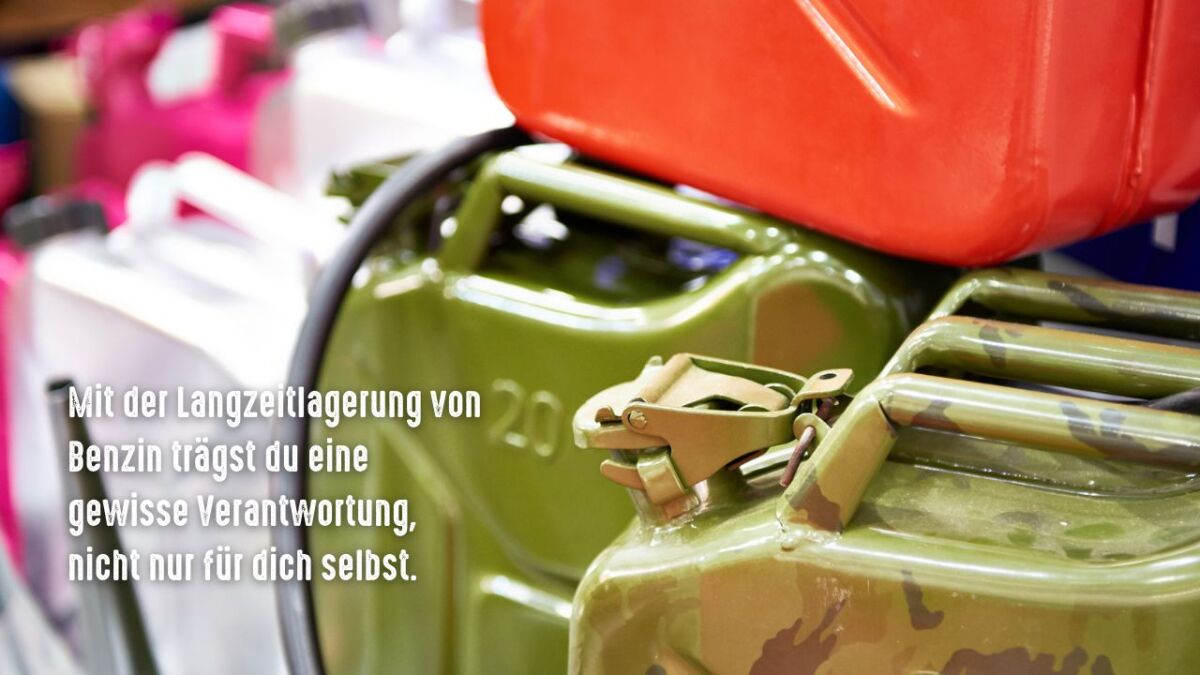
As a fitting closing word: responsibility is something that everyone should value. No matter how much we plan for ourselves, we never plan for ourselves ALONE.
Whether it's family, good friends, or other important people, our goal should be to protect ourselves and the people we love from harm.
It is not our intention to pose a danger to those who matter to us.
Crisis prevention should save, not endanger!
But enough of the lecture: I'm sure you already understand what I'm trying to say and where I'm ultimately going with this. Act responsibly, and nothing will go wrong.
Thank you for your attention. I hope I could help you a little bit, and you feel well prepared for your endeavor to store gasoline responsibly and safely.
If you are looking for further information on various topics, feel free to browse my blog a little more. I would be happy to help you with other topics as well.

Sources for the guide
https://www.gesetze-bayern.de/Content/Document/BayGaV-17
https://bravors.brandenburg.de/verordnungen/bbggstv
https://rp-online.de/leben/auto/ratgeber/wie-lange-ist-benzin-haltbar_aid-13857515
https://gestis.dguv.de/data?name=531390
https://de.wikipedia.org/wiki/Motorenbenzin

Author of the guide
Martin Gebhardt
Hey, I'm Martin. On my blog, you will learn the basics and numerous details about living in the wild. I think survival, bushcraft and the good life in nature are the keys to happiness. Find me here on Instagram or on YouTube. You can find more about my mission on the About Me page.
Was this guide helpful?
41 people found this guide helpful.
5.00 out of 5 points (41 Ratings)
Comments (0)
This post may contain affiliate links. So if you click on the links and make a purchase, I will receive a small commission at no additional cost to you. Click here, to learn more about it.



